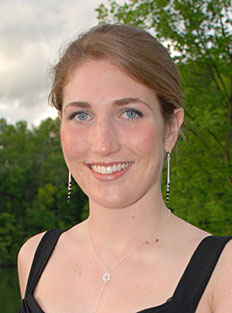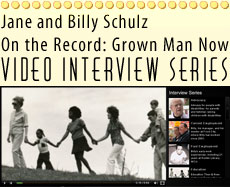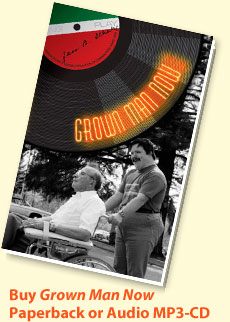 Caddy Hobbs, Student, ETSU
Caddy Hobbs, Student, ETSUStudents Speak Out
Grown Man Now: A Story for Growing People
—Caddy Hobbs, East Tennessee State University (ETSU), for EDFN 2100: Orientation to the Profession of Education
In Grown Man Now, Dr. Jane B. Schulz tells a story from which everyone can learn and that everyone needs to hear. It tells of love, hope, fear, struggles, faith, change, friendship, compassion, drive, and the importance of family. It illustrates both sides to the coins that we all carry in our pockets—the simple yet wonderful humors of life and the woes that compel us to cry, the exhilarations of success and the fears telling us that we aren’t capable, our plans for the future and what the future has planned for us. She shows ordinary people how to be extraordinary; for it isn’t what we are given in life, but how we choose to handle it. Hers is the story of a mother of four and a teacher in times of inequality, all the time being one person in this world.
As a mother, Dr. Schulz was once given the best prescription parents can follow for their children: “Take him home and love him,” said Dr. Rhea, after diagnosing Jane’s third child, Billy, with Down syndrome. Adversity usually stems from a lack of love. The love in the Schulz family created more than a realm of acceptance—there was unity. With all their differences and individuality, they are much like puzzle pieces that come together shaping out a wonderful structure of love, support, and interaction. However, as each of us has discovered, the world is not always a beautiful place abounding in love or acceptance. Faced with negative labels and opposition, Dr. Schulz denied these and instead clung to the fact that Billy was a gift to his family, not a “burden” as some would say. With some added encouragement and patience, Billy did (and does) prove to be a great asset, help, and model—not only to his family, but to any of the people fortunate to make his acquaintance.
Dr. Schulz describes the beginning of her career as an educator as a thrilling, invigorating experience. She was working as a secretary during the day and taking night classes at a nearby college when she went to investigate opportunities for enrolling Billy into the school system. She was informed he would not be able to attend school until the age of eight. With her youngest child, Mary, ready to enter kindergarten the next year, this seemed a horrible injustice. Why should a child with special needs be forced to wait to begin their education? Dr. Schulz found the solution that made all the pieces fall into place.
At that time, the 1960’s, the state of Georgia did not require teacher certification or a college degree for kindergarten teachers. My teaching experience was limited to Sunday School and raising four children, but I felt sure that I could teach kindergarten. In my excitement at the idea, I also fed into the formula the following facts: Mary would be entering kindergarten, John [the oldest son] would be in college, Tom [her second child] in school, I would take Billy with me, and thus there would be no need for child care. Although my salary would be diminished, I would save money and also be at home when the children were there. (p. 60)
She applied for a position, was hired, and got her first car to facilitate the new schedule. As the next year rolled around, Billy was placed in a Special Training Class and Dr. Schulz was presented with her first student requiring special attention. Here she found her direction as a special education teacher, saying, “this desire evolved from my dissatisfaction with some of the special classes I had seen and the insight I had gained from working with Billy and other children who had special needs.” She became a full-time student at Auburn University, visited facilities created for the education of children with mental retardation, found that she knew more than some of her professors, received instruction in math from her children, and graduated with honors. Realizing she wasn’t quite finished, she went on to obtain her master’s in psychology, with focus on intelligence testing and behavior modification. Dr. Schulz entered a central role as a coordinator of special education in the school system where she had previously been a secretary. Through her growth and activism in the field, Dr. Schulz can be seen as a pioneer in bettering special education and the resources and dedication devoted to it. When it was obvious that Billy was not receiving the proper education he needed, another possibility was investigated—enrollment in the special needs class of an all-black school. Billy and his mother were warmly accepted and Dr. Schulz describes his education that year as “one of his best.” Later, while discussing registering for a sixth-year curriculum with the head of the Elementary Education Department, he encouraged her to look into a doctorate. Floored by the idea, she nevertheless took on the challenge, battled, conquered, and graduated with her entire family in attendance.
What could’ve been seen as a culminating event was another progression in a life-long journey. Dr. Schulz has authored, co-authored, and co-edited books pertaining to special education and parent-professional collaboration. She helped Billy in obtaining jobs and establishing his independence. Dr. Schulz lives actively as an educator, advocate, pioneer, friend, and loving mother and grandmother.
Whether we are fighting battles for ourselves or someone else, there are times in life that there are battles we must fight and struggles we must endure. In this world, one could say that we all have special needs and one of the greatest gifts is to be there for someone in the times of theirs. To find a better world, each of us must live our best—we are all just a piece to the greater puzzle, which won’t be complete until we’re all in it together.



